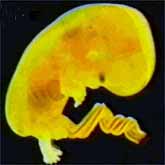The Developing Brain
 During embryogenesis (the process by which an embryo is converted from a fertilized cell to a full-term fetus), brain cells develop at the astounding rate of over 250,000 per minute. There are several points during the process of neurogenesis (the production of brain cells) where over 50,000 brain cells are formed every second. By the twentieth week of fetal life, over 200 billion neurons have been created.
During embryogenesis (the process by which an embryo is converted from a fertilized cell to a full-term fetus), brain cells develop at the astounding rate of over 250,000 per minute. There are several points during the process of neurogenesis (the production of brain cells) where over 50,000 brain cells are formed every second. By the twentieth week of fetal life, over 200 billion neurons have been created.
Later, a massive neural pruning of these large numbers of cells occurs. Approximately six weeks later, during the third trimester, only fifty percent of those cells remain alive. The surviving 100 billion neurons are the healthy cells, which are ready to aid the growth and development of the newborn child. The early overproduction of neurons and neural networks guarantees that the young brain will be capable of adapting to virtually any environment into which the child is born, whether it is San Francisco, South Africa or Singapore, tropical or tundra.
About the Author
Kenneth A Wesson
 Kenneth Wesson is a keynote speaker, writer and educational consultant for pre-school through university-level institutions and organizations. He speaks throughout the world on the neuroscience of learning and
methods for creating classrooms and learning environments that are 'brain-considerate.' Ken’s articles appear in educational journals.
Kenneth Wesson is a keynote speaker, writer and educational consultant for pre-school through university-level institutions and organizations. He speaks throughout the world on the neuroscience of learning and
methods for creating classrooms and learning environments that are 'brain-considerate.' Ken’s articles appear in educational journals.


